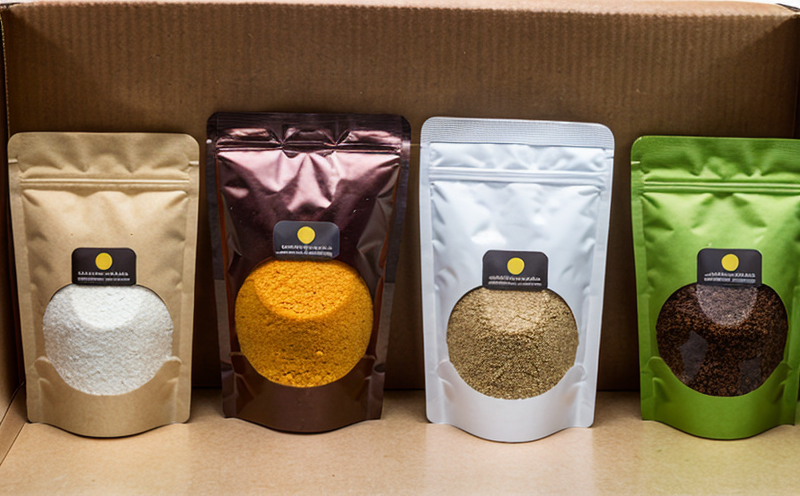Seal Integrity Testing of Food Contact Packaging
The integrity of seals in food contact packaging is critical to ensuring product safety and quality. A breach in seal integrity can lead to contamination, spoilage, or the ingress of harmful substances into the packaged food. Seal integrity testing is essential for verifying that these seals meet regulatory requirements and consumer expectations. This service ensures that food contact materials (FCMs) and their packaging are safe, compliant with relevant standards, and reliable.
The seal integrity test primarily evaluates the strength and durability of the bond between different layers of a multi-layered packaging material or between the closure device and the container body. The test simulates real-world conditions to assess how well the seal holds up under various environmental stresses such as temperature changes, humidity exposure, and mechanical forces during handling.
The testing process involves several key steps: specimen preparation, application of stress, observation for failure points, and evaluation against predefined criteria. Specimens are selected based on their composition and intended use within the food packaging industry. Common materials include polyethylene terephthalate (PET), low-density polyethylene (LDPE), aluminum foil, and other multi-layered structures.
For effective testing, specimens must be prepared according to specific protocols outlined in international standards such as ISO 17025, ASTM D3968, or EN 14411. These guidelines ensure that the test results are reliable and repeatable across different laboratories around the world.
The actual testing methods vary depending on the type of seal being evaluated. For example:
- Bubble point testing (ASTM D3968) measures the pressure at which water vapor begins to pass through a porous membrane, indicating potential breaches in the seal.
- Pressure decay testing assesses leaks by applying a controlled amount of gas or liquid under pressure and measuring how quickly the pressure drops over time.
- Water immersion tests simulate long-term exposure to moisture and evaluate whether the seal remains intact after prolonged contact with water.
The results from these tests are crucial for identifying any weaknesses in the packaging design or manufacturing process that could compromise the integrity of the seal. Compliance officers, quality managers, and R&D engineers benefit greatly from this service as it provides valuable insights into potential issues early on in product development cycles.
Additionally, understanding the specific requirements set forth by regulatory bodies like the FDA (US Food & Drug Administration) or EFSA (European Food Safety Authority) helps ensure that all testing aligns with current best practices and legal expectations. By adhering to these standards during seal integrity tests, manufacturers can demonstrate their commitment to producing safe, high-quality food contact packaging.
Eurolab Advantages
At Eurolab, we pride ourselves on providing comprehensive and accurate seal integrity testing services tailored specifically for the food contact materials sector. Our experienced team of experts uses state-of-the-art equipment to conduct rigorous tests that meet or exceed industry standards.
- Precision Instruments: Utilizing advanced testing machines capable of replicating real-world conditions, we can precisely simulate environmental factors like heat, humidity, and mechanical stress. This ensures our test results are highly representative of actual usage scenarios.
- Compliance Expertise: Our staff stays abreast of all relevant regulations and guidelines, ensuring that every aspect of your testing aligns with current requirements. Whether you're operating in North America or Europe, we have the knowledge needed to help you navigate complex regulatory landscapes.
- Robust Reporting: Beyond just passing or failing results, our detailed reports offer valuable insights into areas where improvements can be made. This helps companies refine their processes and maintain high standards throughout the supply chain.
We also offer additional services that complement seal integrity testing, such as migration studies, chemical analysis, and sensory evaluation, further enhancing your overall quality assurance program.
Environmental and Sustainability Contributions
By ensuring robust seal integrity in food contact packaging, we contribute positively to both environmental sustainability and public health. Properly sealed packages minimize waste by preventing premature spoilage of contents, which reduces the need for replacement products and decreases landfill contributions.
In addition, compliant seals play a role in reducing the amount of energy consumed during production processes since less material is wasted due to leakage or contamination. Furthermore, using recycled content in packaging materials while maintaining strong seals can significantly reduce the carbon footprint associated with manufacturing new products from raw resources.
At Eurolab, we support sustainability initiatives by offering eco-friendly testing solutions that do not compromise on accuracy or reliability. Our commitment extends beyond mere compliance; it includes proactive measures aimed at fostering a more sustainable future through responsible practices and innovative approaches in packaging design.





